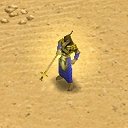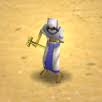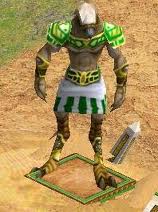| This article is about the the Egyptians featured in Age of Empires. For Egyptians (Age of Empires), see [[{{{3}}}]]. |
The Egyptians are one of three (four in the Titans expansion) cultures in Age of Mythology.
Gods
Major Gods
Classical Age Gods
Heroic Age Gods
Mythic Age Gods
Resource Gathering
Laborers, the Egyptian workers, are slower at gathering resources than other cultures' workers. This can be offset by having the Pharaoh (or with Ra, Priests) empower the relevant drop-off building. The Egyptians have a different drop-off site for food, wood and gold, and they are all built slowly. On the other hand, all these buildings are free.
Heroes
Unlike the Norse and Greeks, The Egyptian hero is not simply a regular unit with an attack bonus against Myth Units. Instead the Egyptians have the Pharaoh, a hero that heals and is devastating against Myth Units, and Priests, which are essentially lesser versions of the Pharaoh. The Egyptian player starts with a Pharaoh and a Priest. Priests are fairly expensive and rather weak against regular units.
Pharaoh

The Pharaoh is a fairly tough warrior, but is still no match for many human units. However, he is a powerful support unit due to his large attack against enemy Myth units and ability to heal. Set's Pharaoh can also summon animals.
The Pharaoh's most interesting ability is empowering (for more details, see the main Pharaoh entry.) If killed, the Pharaoh regenerates at the player's starting Town Center after one and a half minutes, He is never out of action for long.
Son of Osiris

Using the Son of Osiris God Power (supplied, unsurprisingly, by Osiris), the Pharaoh can be turned into a falcon-headed semigod. He still has the Pharaoh's abilities, but is vastly more powerful in combat. The Son of Osiris has increased armor, many more hit points and a powerful, chain-lighting attack that can hit up to four targets at once. However, you cannot heal him, and if he is killed, a normal Pharaoh will be reborn.
Priest

Like the Pharaoh, the Priest has a ranged attack with a large attack bonus against mythological units, but is very weak against regular units. It can also heal units. The Priest has the additional ability to summon obelisks, which are cheap and quickly placed structures that provide a large line of sight. Priests can be trained at the Town Center (once a temple has been built) or at the Temple. All three civilizations have a bonus to their priests - Ra's can empower buildings like the Pharaoh, Isis' place outposts faster and at lower cost, and Set's can convert wild animals to serve the player.
Favor
The Egyptian player gains Favor by building five different monuments to the glory of his chosen god. Each of these monuments generates favor at a set rate. Once the monuments are built, this method of gaining favor doesn't require any management. Though it is not as easy to regulate as the Greeks' method (putting more villagers on the Temple), empowering monuments can increase the total favor coming in a little.
Titan (The Titans expansion only)
The Titan available for the Egyptians is the God Horus.
Starting Conditions
Each of Age of Mythology's three cultures has different starting conditions in a normal game. The Egyptians start with a Pharaoh, a Priest, and two Laborers. The Priest is typically used to scout and the Pharaoh to empower the Town Center or wherever Laborers are gathering resources.
Language (Ancient Egyptian)
- Antio/intoyou
- You-a-ear
- Hayoh/ taiyoh/ taeyu - Good / Well
- Ark
- Aerifear
- Eel-you-refer
- Hroengyawet (M) Hroeyatawit (f) - wood
- Endwege/inwedge
- Gerrick/geregg/grikk
- Baya (f) Beiya (m) - mine
- Nitu
- Eya ackjiu - attack
- Ackjiu - attack
- Eya air erracter - attack
- Enejereek - I am king
- Heisora - animal of Set
- Edowa - animal of Set
- Hahiru - animal of Set
- Nu - hunter
- Naya insurhret (f) nayendesshret (m) - forage

